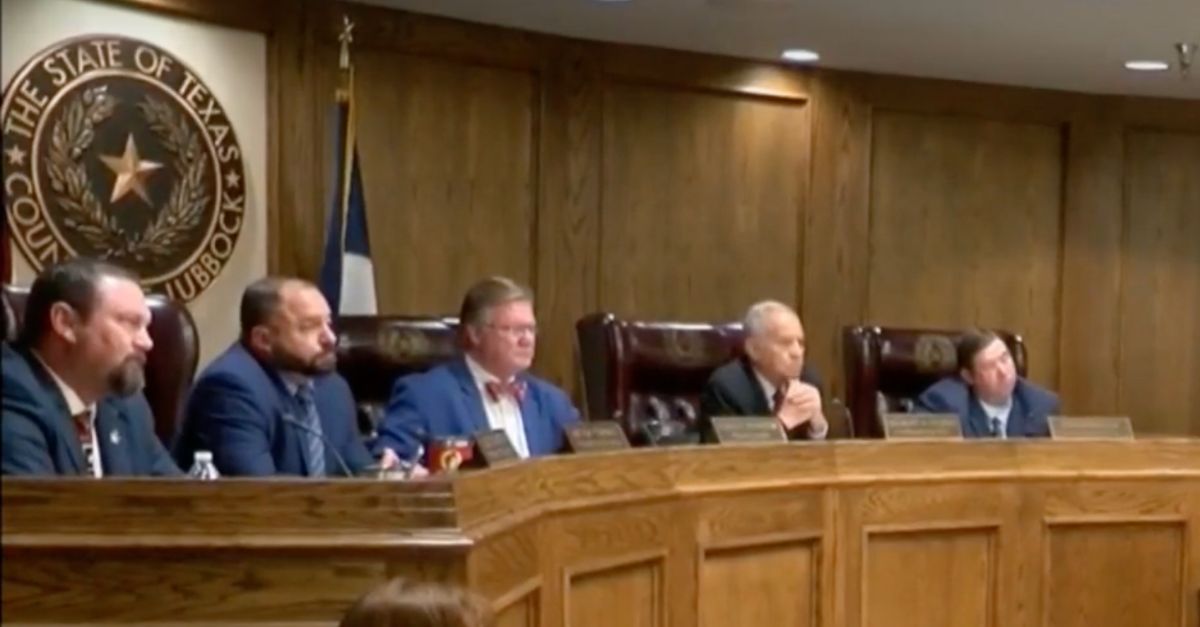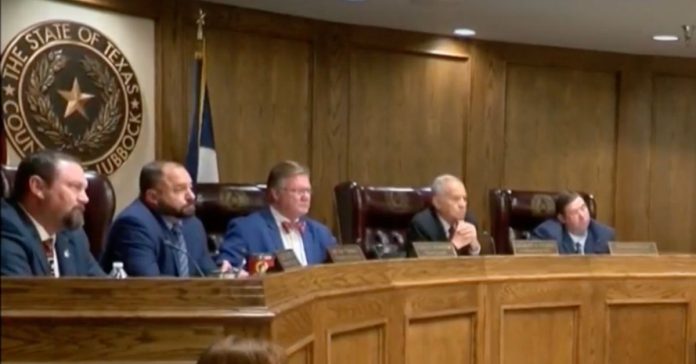
During a regular meeting on Monday, Lubbock County, Texas commissioners passed an ordinance prohibiting traveling for the purpose of abortion, no matter the destination. (screengrab via YouTube)
An all-male panel of commissioners in Lubbock County, Texas, voted Monday to outlaw transporting or even helping to fund transporting people out of state if the purpose of the trip is to get an abortion. The panel said the ordinance was part of its plan to make Lubbock a “sanctuary county for the unborn.”
Commissioners Terence Kovar, Jason Corley, and Jordan Rackler voted in favor of the ordinance, and the body’s two other members — County Judge Curtis Parrish and Commissioner Gilbert Flores — abstained. The commissioners declared that “abortion is a murderous act of violence,” and lamented that “Texas men and women are being hurt and traumatized by abortion across our Texas-New Mexico border and sent back to Texas for our county and our cities to deal with the aftermath in our homes, schools, churches, and hospitals.”
To protect said men and women from these ostensible hardships, the committee made it illegal transport any individual to have an abortion “regardless of where the elective abortion will occur.”
In other words, it is illegal to take someone to any location including out of the state to have an abortion. It is now also illegal to offer, give, or lend money to anyone who will then use the money to travel somewhere to get an abortion.
The ordinance does not impose criminal penalties, but allows for private lawsuits against violators for a number of compensatory damages as well as a $10,000 fine for each violation.
Lubbock County, named for a Confederate colonel, has a population of over 310,000. It is now the largest county in Texas to pass such a law, joining the rural counties of Goliad, Mitchell and Cochran, which have already passed similar legislation.
Lubbock’s ordinance raises significant questions of constitutionality with respect to what is known as the “dormant commerce clause.”
The dormant commerce clause is not an actual clause in the Constitution but a legal principle that can best be understood as a turf battle between individual states and the federal government. Under Article 1, Section 8, Clause 3, Congress has the sole power “to regulate commerce with foreign nations, among states, and with the Indian tribes.” When Congress has not passed specific laws governing a particular aspect of interstate trade, its power to do so lies “dormant.” This unused but available authority belongs to Congress alone — and not to individual states.
States, therefore, are not permitted to use their laws to restrict the flow of commerce from state to state without the explicit approval of Congress. Supreme Court precedents reaching back decades have invalidated state regulations that did things to restrict travel, transportation, and commerce between states.
For example, a New York law that attempted to protect its dairy industry during the 1930s by prohibiting the purchase of milk from outside the state was found to violate the dormant commerce clause because it inhibited interstate activity. In the late 1970s, a New Jersey law that established different standards for waste brought from outside the state from that which originated in New Jersey was struck down for the same reason. Other examples of laws that violated the dormant commerce clause included an Illinois law that required an unusual type of mudflaps to be used on trucks and a Connecticut statute that required out-of-state shippers to put particular labels on beer.
Typically, dormant commerce clause analysis requires courts to determine whether a particular state regulation is primarily aimed at public health and safety — which falls squarely within state control — or is primarily discriminatory against interstate interests. However, most dormant commerce clause challenges involve regulations that do not explicitly restrict travel or transportation.
Although Lubbock’s ordinance would arguably fall into the sphere of “public health and safety,” its direct restriction on travel makes its legality highly suspect. Of course, the conservative Supreme Court has not only proven itself to be hostile to abortion in many contexts, it also ruled recently that the dormant commerce clause did not invalidate California’s tight restrictions on pork production despite their serious economic impact on an interstate industry.
Planned Parenthood of Greater Texas spokesperson Autumn Keiser released a statement Tuesday denouncing Lubbock’s ordinance as an “unnecessary, confusing, and fear-inducing barrier to essential healthcare.”
Have a tip we should know? [email protected]

